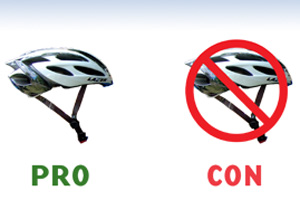The Helmet Law Debate

PRO
By Bob Freeman
Bicycle helmets save lives. There is no disputing it. There are many Web sites full of statistics that prove this. A site that summarizes many of them is at the bottom of this article.
Look at these statistics from the Snell Memorial Institute, the organization that wrote the first helmet standards in 1973 and continues to monitor and amend those standards:
• Every year the estimated number of bicycling head injuries requiring hospitalization exceeds the total of all the head injury cases related to baseball, football, skateboards, kick scooters, horseback riding, snowboarding, ice hockey, in-line skating and lacrosse.
• Estimated indirect costs for injuries to unhelmeted cyclists are $2.3 billion yearly.
• In bicycle crashes, two-thirds of the dead and an eighth of the injured suffered brain injuries.
• 95 percent of bicyclists killed in 2006 reportedly were not wearing helmets.
There is no street that is 100 percent safe, nor speed that is 100 percent safe, and no amount of experience can protect you from the unexpected car, dog, skater, pedestrian, or other obstacle that can cause an accident. Head injuries can occur when falling while riding at walking speed, from any cause. Why would anyone wear a helmet only some of the time, or not at all? Life is precious, and all too short.
Some people argue that helmet use should be the individual’s choice, and that regulation is not only unnecessary, but an infringement on our rights. All of society pays the cost of unhelmeted cyclists. Very little of the cost is borne by the unhelmeted cyclists themselves—most of them died! And helmet users are not exempt from sharing in these costs.
Aside from the costs, if helmet regulations encourage more people to wear helmets, and thus save lives, how can that be a bad thing?
www.helmets.org/stats
Bob Freeman has been a helmet advocate since 1974 when he got his first bicycle helmet and saw his first traumatic head injury from a helmetless cyclist falling off her bike. She lived, but was permanently disabled. Bob is also the co-owner of Elliott Bay Bicycles near Seattle’s Pike Place Market.
CON
By Aaron Goss
Helmet regulations and laws discourage bicycle riding.
Note I used the words “bicycle riding,” not cycling. To me, riding a bike is NOT a sport. I am not a “serious cyclist” or a “racer” or even a “cyclist.” I do not even consider myself an enthusiast. I just ride bikes! I own a bicycle shop because I love to fix bikes. I sell helmets and could make more money if I used fear (1) to sell them. But, I don’t think you need a helmet to ride
every time.
I think it matters how you are riding, where and what type of bike you are riding. For example, riding a beach cruiser at the beach should not require a helmet. I am NOT anti-helmet and I wear one when I mountain bike, but not when I ride for transportation. I am anti-helmet law. I am against it because I think it discourages folks from hopping on their bike instead of in their car.
Many folks come into my shop and ask if it is the law to wear a helmet. I tell them yes and show them helmets. Sometimes they buy one and sometimes not. I find that sad because they probably won’t ride much. To me it is more important that folks ride regardless of their hat type. When more people ride, everyone becomes safer.
It has been proven in many cities that accident rates go down with increased bike use, most recently in Portland, Ore. (2) Is our goal to require a certain hat or to make society as a whole safer? If it is the latter, then helmet laws are not necessary! It has been shown in many cities that helmet regulations discourage cycling. The effectiveness of the 1990 Australia law is unclear. (3)
Modern helmets are designed more to sell than to protect. The only test required is to drop it with an 11-pound weight in it from 6.5 feet. The head-form sensor must not register more than 300 G’s. (4) There’s much finger-pointing between helmet companies as to how well they pass the test. Some racing helmets barely pass the test. The point is, you don’t know! The only way to tell if a helmet is “safe” is if they have a U.S. Consumer Product Safety Commission (CPSC) sticker and all helmets at bike shops do.
Helmets may protect you to a certain degree if you fall on your head. My question: why don’t bicycle helmets offer more protection? Why don’t they protect your face? Why don’t they have a hard shell? Skateboard style helmets seem like a good idea and are very popular.
Why isn’t there a law requiring persons doing more dangerous activities to wear helmets? Would you agree that skateboarding, roller skating, inline skating, skiing and snowboarding are activities where one is likely to hit one’s head? Why did the King County Board of Health single out bicyclists for “protection”? Education and peer pressure work much better at encouraging helmet use. (5)
If we must have a helmet law, let it be state-wide and for those 16 and younger ONLY (and also include other kinetic activities).
www.portlandoregon.gov/transportation/article/237507
bikeportland.org/wp-content/images/bridge_crashes_big
ipa.org.au/publications/2019/australia’s-helmet-law-disaster; www.helmets.org/veloaust
www.cpsc.gov/businfo/regsumbicyclehelmets
btaoregon.org/2011/10/bta-policy-on-bicycle-helmets
Aaron Goss is the president of Aaron’s Bicycle Repair, Inc. in Seattle, Wash. You can find them at
www.rideyourbike.com.




Pete at Electric Bike Report, 2 years ago
Well, either way, at least there are cool looking bike helmets!
http://electricbikereport.com/cool-bike-helmets/
Ted Diamond, 2 years ago
When that car comes barreling through the red light or yield sign, or veers into the bike lane, I don’t think it makes any difference what your intentions are, whether to ride for sport or to ride for transportation.
Twelve weeks ago, a helmet saved me from certain death or permanent brain injury. I was riding home from work. As staggering as the cost of the EMS, ER, and hospital stay were, I hate to think that they would have been had I not been wearing a helmet.
Concerned Citizen, 8 months ago
Helmet laws are a bit more than an “encouragement” to wear a helmet, it’s a cop, with a gun, pepper spray, baton, tazer, etc… willing to use any force required(even lethal force) to stop you and ticket you, if you chose not to wear a helmet on a short little trip somewhere. If you forget or lose a helmet, or have one stolen it could lead to a fine, and waste of time dealing with the ticket.
It is possible to advocate helmet use, without dispatching expensive, armed, enforcers to do the “encouraging” for you.